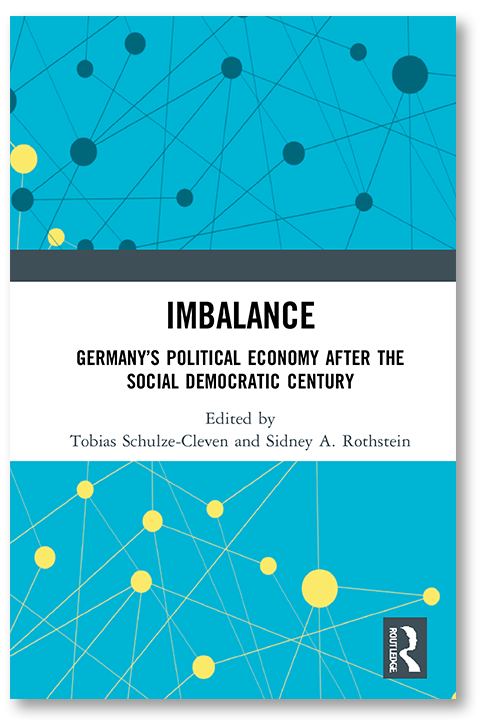
Imbalance: Germany’s Political Economy after the Social Democratic Century
Edited by Tobias Schulze-Cleven and Sidney A. Rothstein

Germany is a central case for research on comparative political economy, which has inspired theorizing on national differences and historical trajectories. This book assesses Germany’s political economy after the end of the "social democratic" 20th century to rethink its dominant properties and create new opportunities for using the country as a powerful lens into the evolution of democratic capitalism.
Documenting large-scale changes and new tensions in the welfare state, company strategies, interest intermediation, and macroeconomic governance, the volume makes the case for analysing contemporary Germany through the politics of imbalance rather than the long-standing paradigm of institutional stability. This conceptual reorientation around inequalities and disparities provides much-needed traction for clarifying the causal dynamics that govern ongoing processes of institutional recomposition. Delving into the politics of imbalance, the volume explicates the systemic properties of capitalism, multivalent policy feedback, and the organizational foundations of creative adjustment as key vantage points for understanding new forms of distributional conflict within and beyond Germany.
The chapters in this book were originally published as a special issue of German Politics and build on a workshop from mid-2017.
See Tobias Schulze-Cleven’s interview with Rutgers Today, as well as book reviews published in EuropeNow and German Political Science Quarterly.
See also the flyer for the online roundtable discussion “Germany after Merkel: A roundtable discussion of the federal election results,”co-sponsored by CGWE, SMLR and the Rutgers Center for European Studies, featuring the editors of the volume and Christian Lemke (UNC/Leibniz University)
Table of Contents
- Beyond Stability: Rethinking Germany’s Political Economy
Sidney A. Rothstein and Tobias Schulze-Cleven - Germany after the Social Democratic Century: The Political Economy of Imbalance
Sidney A. Rothstein and Tobias Schulze-Cleven - Going Up-Skill: Exploring the Transformation of the German Skill Formation System
Niccolo Durazzi and Chiara Benassi - Regulating the Transition from Work to Retirement: Towards a New Distribution of Responsibilities Between the State, Social Partners and Companies?
Ute Klammer - Strong Firms, Weak Banks: The Financial Consequences of Germany’s Export-Led Growth Model
Benjamin Braun and Richard Deeg - Financial Market Capitalism and Labour in Germany. Merits and Limits of a Sociological Concept
Thomas Haipeter - The Transnational Activities of German Trade Unions and Works Councils: From Foreign Policy to Active Engagement
Stephen J. Silvia - Employer Resistance to Works Councils: Evidence from Surveys amongst Trade Unions
Martin Behrens and Heiner Dribbusch - The Political Economy of the SPD Reconsidered: Evidence from the Great Recession
Björn Bremer - From Sick Man of Europe to the German Economic Power House. Two Narratives: Ordoliberalism versus Euro-Currency Regime
Brigitte Young - Inequality in Germany: A Macroeconomic Perspective
Jan Behringer, Nikolaus Kowall, Thomas Theobald and Till van Treeck - Surplus Germany
Wade Jacoby - Debating Lessons from Germany after the Social Democratic Century
Walther Müller-Jentsch, Britta Rehder, Sidney A. Rothstein and Tobias Schulze-Cleven
Reviews
"Germany, or better: West Germany, used to be an ideal place to explore the benefits of functional complementarity in political-economic institutions. This is long gone. The editors of this exciting collection have rightly chosen ‘imbalance’ as the guiding concept for an excellent suite of articles on the German political economy today. What happened to Germany’s much-admired institutional coherence, to its institutional stability, viewed successively as advantage and disadvantage? How did German institutions contribute to the country’s rise to hegemony in the European Union, and what are the longer-term prospects of the German social model under the euro? The articles in this book take readers to the very front of research on these and similar issues."
– Wolfgang Streeck, Emeritus Director, Max Planck Institute for the Study of Societies
"At a moment of upheaval in advanced capitalism, this book represents a sophisticated scholarly re-examination of Germany, long viewed as a paragon of capitalist success. With contributions by some of the most accomplished scholars of German politics and comparative political economy, it demolishes the tired stereotypes of German political consensus and institutional stability and demonstrates that the German model has long evinced a deep and abiding capacity for institutional dynamism. The book is an absolute must-read for anyone wishing to understand contemporary Germany or the broader challenges faced by contemporary capitalist societies in a time of crisis and uncertainty."
– Mark I. Vail, Worrell Chair of Politics and International Affairs, Wake Forest University
"Schulze-Cleven and Rothstein have assembled a group of first-rate scholars with extraordinarily deep expertise in the current political economic situation in Germany. Plagued by problems of technological change, inequality, the assimilation of immigrants, the challenges of climate change, and the growth of right-wing populism, Germany is finding that many of the institutional mechanisms that it had relied on for stability have proven weak and ineffective. There is great uncertainty regarding how things will play out. Conflict is distressing, but the range of experiments around reform discussed in this volume is exciting. The scholars in this volume not only provide an excellent diagnosis of current German difficulties; they also provide a modicum of hope for the future. This should be a go-to book for anyone interested in the latest developments on the German political economic scene."
– Gary Herrigel, Paul Klapper Professor in the College and Division of Social Sciences,
Department of Political Science, University of Chicago
"Our understanding of modern political economy still rests on national economic and political institutions that were shaped by the industrial revolution and peaked in the second half of the 20th century. Yet the world has entered a profound shift towards the global knowledge economy, which redefines established institutions, restructures value creation, and pushes the role of corporate power onto the political agenda. Germany is a key case in this process, given its remarkably different growth strategies and politics compared to other rich countries. This book analyzes continuity and change in Germany’s political economy across important policy fields: industrial relations, social policy, finance, macroeconomics, and social-democratic politics. It is an interesting and welcome contribution to an important debate."
– Anke Hassel, Professor of Public Policy, Hertie School
"The German economy has become even more central to Europe’s political economy. The conventional view of Germany is that its political and economic systems are marked by stability. This brilliant new book uses the concept of imbalance to explain the way in which the German economy has changed and is continuing to change. It is a must-read for anyone interested in German politics or political economy more widely."
– William E. Paterson, Emeritus Director, Institute for German Studies, University of Birmingham;
Co-Founder, International Association for the Study of German Politics (IASGP); Founding Co-Editor, German Politics




